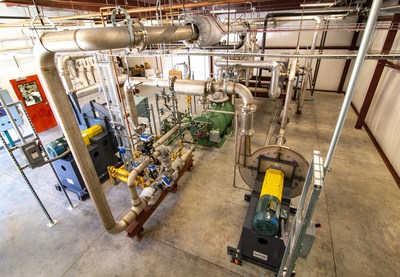
Independent SCR catalyst testing facility fully functional for 2019
January 16, 2019
By Innovative Combustion Technologies
Jan. 16, 2019 - Innovative Combustion Technologies (ICT) announced it has commissioned its new Selective Catalytic Reduction (SCR) Catalyst Testing Facility, designed to test and evaluate performance of SCR catalyst samples from utility power plants firing coal, natural gas, biomass, and other solid, gaseous, or liquid fuels used to reduce emissions of nitrogen oxides (NOx).

The testing facility – the only independent, pilot-scale SCR catalyst testing facility in the U.S. – is now fully operational and employs five highly-skilled engineers and technicians in the areas of catalyst testing, combustion troubleshooting, field catalyst sampling, and inspection. With it, ICT adds the capability to provide catalyst activity testing and catalyst management services to its existing SCR tuning and field-testing capabilities.
“Our customers rely on ICT to deliver unbiased, mission-critical testing capabilities that will help maximize the life of their SCR catalysts,” said Richard Storm, President of ICT. “The new facility will tap into ICT’s tremendous engineering talent and combine it with our world-class testing capabilities to meet the complex needs inherent in today’s power industry.”
Storm continued, “The tests implemented in our new facility will help determine catalyst deactivation rates, which we use to provide proactive corrective measures for system optimization that help minimize the plant lifecycle operating costs associated with SCR systems. We are excited about this expansion and very proud of our engineering team who help ensure our testing capabilities meet our customer’s needs and strict industry standards.”
ICT is able to perform the following key measurements, on plate-, honeycomb-, and corrugated-type catalyst:
Determination of SCR catalyst deNOx activity (k-value) Determination of SO2 to SO3 conversion rate Physical inspection and dimensional measurements to confirm geometric design, estimate fouling/plugging, and evaluate structural integrity Data compilation and storage to establish historical deactivation trends XRF chemical analysis BET surface area/pore-size distribution analysis Mechanical stability testing Pressure drop
About SCR Catalyst Testing
When NOx, a byproduct of all fossil fuel combustion, enters the atmosphere it contributes to acid rain, smog, and pollution. Breathing air with a high concentration of NOx can irritate airways in the human respiratory system. Because of this, the Environmental Protection Agency (EPA) regulates NOx emissions.
SCR is the process of catalytically converting NOxfrom the flue gas stream to nitrogen (N2) and water vapor (H2O), which drastically reduces harmful emissions in order to satisfy the strictest regulatory requirements. Since SCR catalysts degrade in performance with time, a proper catalyst management program must account for the catalyst degradation trend as well as the SCR system’s overall performance. SCR owners and operators must have detailed knowledge of all parts of the SCR system in order to make accurate decisions regarding catalyst replacement cycles and outage schedules.
Routine SCR catalyst testing takes the guesswork out of determining when the catalyst will reach the end of its usable life, ensuring reliable plant emissions performance and maximizing the value of investments made in constructing and operating SCR systems. Over the course of five years, ICT customers have experienced a return on investment (ROI) greater than 850 per cent* from a regular catalyst sampling and testing program. *See paper 59 on www.innovativecombustion.com for further details.
Print this page